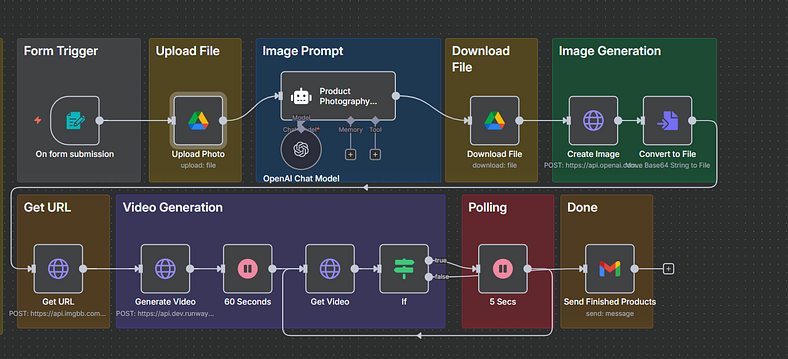🚀 Automating Product Photo to Video Generation with n8n

The Problem
Turning a single product photo into a polished, cinematic marketing video is time-consuming. Usually, it involves switching between multiple tools: uploading files, designing prompts, running AI models, downloading outputs, and finally sharing them. For a business running multiple products, this quickly becomes a bottleneck.
The Idea
What if we could automate the entire journey — from uploading a product photo to receiving a ready-to-use marketing video in your inbox? That’s exactly what I built using n8n + AI-powered tools like OpenAI, Runway, and image hosting APIs.
The Workflow Story
Here’s how the pipeline works step by step:
1. Form Trigger
It all begins when a user submits a form with their product photo. This instantly triggers the workflow in n8n.
2. Image Upload
The photo is uploaded to cloud storage (Google Drive in this case), ensuring that the original file is safely stored and accessible for later steps.
3. Prompt Generation with AI
Here’s where the magic happens: I use OpenAI’s Chat Model to automatically generate a professional photography prompt based on the product type. 👉 Example: If someone uploads a shoe photo, the model writes a cinematic product prompt describing lighting, background, and angles.
4. Image Enhancement
Using the prompt, the workflow calls the OpenAI Images API to generate a polished version of the product photo. The file is then converted and saved for further processing.
5. Get URL
To feed the image into a video generation API, the photo is uploaded to ImgBB, returning a shareable public URL.
6. Video Generation (Runway API)
The heart of the workflow: the product image is passed to Runway’s video generation API, with instructions to create a smooth, rotating cinematic shot.
7. Polling & Wait Mechanism
Since video rendering takes time, the workflow includes a smart polling loop — checking every few seconds if the video is ready. No more guessing or refreshing pages.
8. Final Delivery
Once complete, the finished video is automatically emailed to the user. The result? A ready-to-use product marketing clip — without opening a single editing tool.
Why This Matters
This workflow eliminates hours of manual editing, giving businesses the ability to: ✅ Scale marketing faster ✅ Maintain consistency in style ✅ Deliver professional-quality videos with minimal effort
Next Steps
I’m experimenting with alternatives like Pika Labs API and Stable Video Diffusion for more flexible video outputs. The goal is to make this workflow cost-effective, scalable, and open-source friendly.
💡 Imagine this setup embedded into an e-commerce system: upload a product → instantly get marketing-ready videos. That’s the future of content automation.